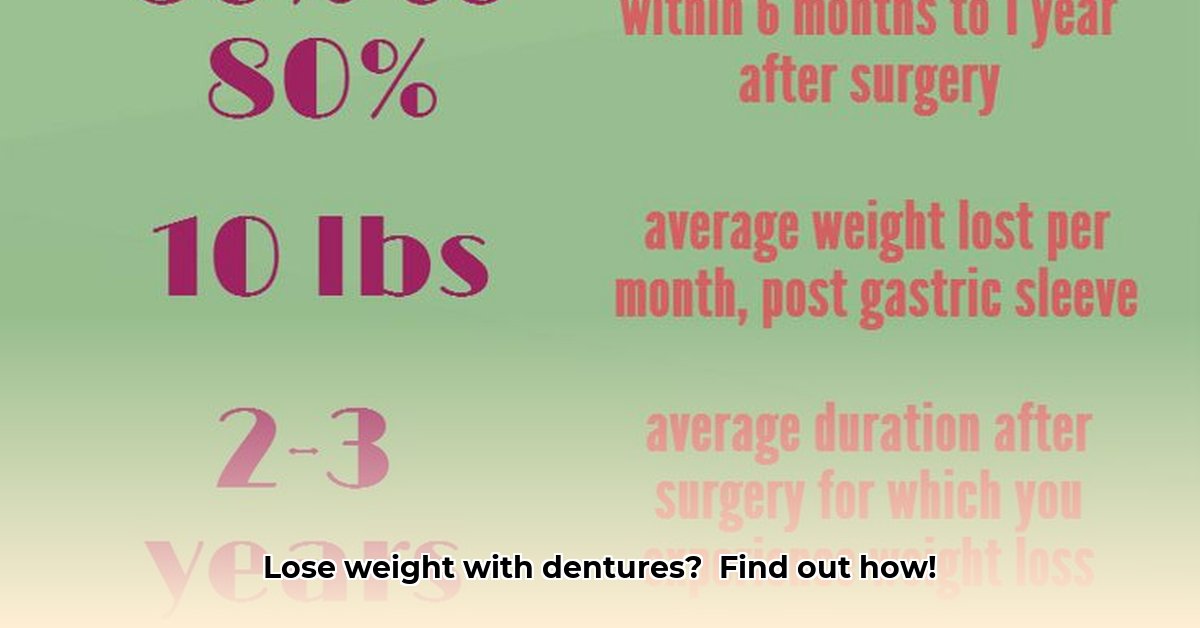
Understanding Weight Changes After Denture Fitting
Getting dentures is a significant life change, and it's understandable to wonder about its impact on your weight. While some weight loss is common initially, the long-term effects are complex and depend on various factors. This comprehensive guide will explore the science behind denture use and nutrition, helping you navigate weight management effectively.
How Dentures Impact Eating Habits
The transition to dentures significantly alters your eating habits. Complete dentures (replacing all teeth) pose a more substantial challenge than partial dentures (replacing some teeth). Chewing becomes more difficult, potentially leading to a reduction in food intake and, consequently, some initial weight loss. However, this is only one piece of a much larger puzzle.
Your chewing ability directly affects nutrient absorption. The Mini Nutritional Assessment-Short Form (MNA-SF) (a standardized assessment tool used to identify nutritional risks) is sometimes employed to evaluate potential deficiencies. While some studies suggest a correlation between complete dentures and increased risk of malnutrition, results are inconsistent and depend heavily on factors beyond denture type alone. Furthermore, the impact of partial dentures on nutrition is often less pronounced than that of complete dentures. Ongoing research continues to refine our understanding of this complex relationship.
Factors Affecting Weight After Denture Fitting
Beyond the type of denture, several other factors significantly influence weight changes:
- Denture Fit: Poorly fitting dentures can cause pain and discomfort, making eating difficult and potentially limiting food intake. Regular dental check-ups are crucial for adjustments and ensuring a comfortable fit.
- Overall Health: Pre-existing health conditions can independently affect appetite, weight, and the body's ability to process nutrients.
- Pre-existing Dietary Habits: Individuals who already maintain a healthy diet before receiving dentures generally adapt more smoothly than those with less balanced eating habits.
- Psychological Factors: Adjusting to dentures can impact confidence and social eating experiences. Feeling self-conscious might limit participation in social dining, potentially affecting overall food intake.
Average Weight Change: A Nuance, Not a Number
There's no single "average" weight loss after getting dentures. Weight changes vary significantly, ranging from slight initial weight loss to no change at all, or even slight weight gain. Individual experiences are highly diverse and depend on the interplay of the factors discussed above. Focusing on healthy eating strategies and regular dental care is far more valuable than fixating on an arbitrary average.
Instructional Guide: Maintaining a Healthy Weight and Nutrition
This section provides actionable strategies for maintaining a healthy weight before, during, and long after your denture fitting.
Short-Term Strategies (0-1 Year)
- Prioritize Soft, Nutrient-Rich Foods: Start with soft, easily chewed, and nutrient-dense foods like mashed potatoes, cooked vegetables, yogurt, and soft fruits. This ensures adequate nutrient intake while minimizing discomfort.
- Mindful Eating: Pay close attention to your body's hunger and fullness cues. Avoid overeating, especially in the initial adjustment period.
- Gradual Reintroduction of Harder Foods: As your chewing ability improves, steadily introduce firmer foods, cutting them into small, manageable pieces.
- Regular Dental Check-ups: Schedule regular visits to your dentist for denture adjustments and to address any fitting issues promptly.
Long-Term Strategies (Beyond 1 Year)
- Balanced Nutrition: Maintain a balanced diet rich in fruits, vegetables, lean proteins, and whole grains. This contributes to overall health and well-being.
- Weight Monitoring: Regularly monitor your weight to detect any significant changes promptly. Discuss any concerns with your doctor or dentist.
- Ongoing Dental Care: Continue regular denture care (daily cleaning) and scheduled dental check-ups to maintain proper fit and oral hygiene.
Conclusion
While initial weight fluctuations are possible after receiving dentures, maintaining a healthy weight and nutritional intake is achievable with a proactive and informed approach. Prioritize a balanced diet, regular dental care, and open communication with your healthcare team to support your overall well-being. Remember, there is no "one-size-fits-all" answer; focus on establishing healthy habits that suit your individual needs and lifestyle.